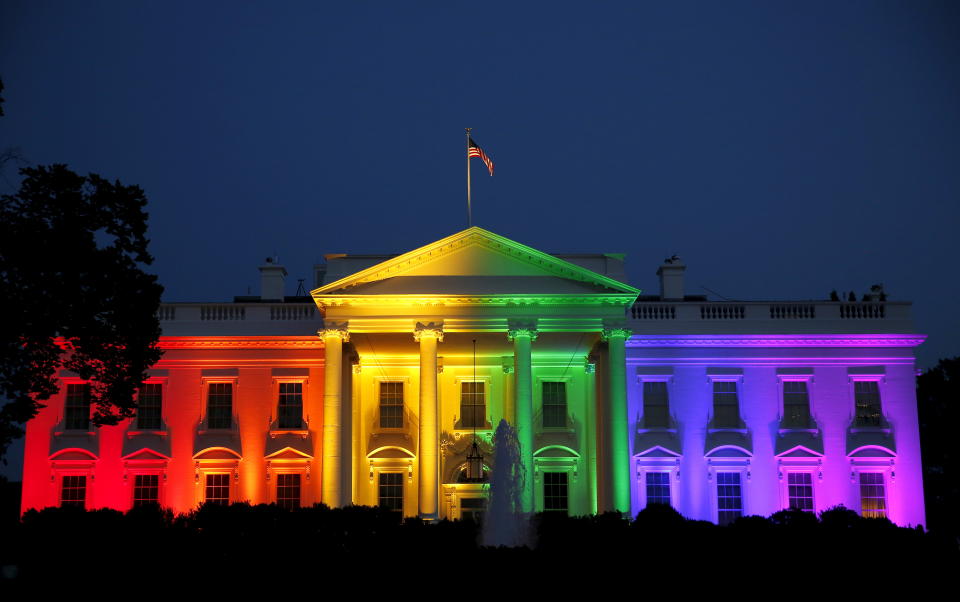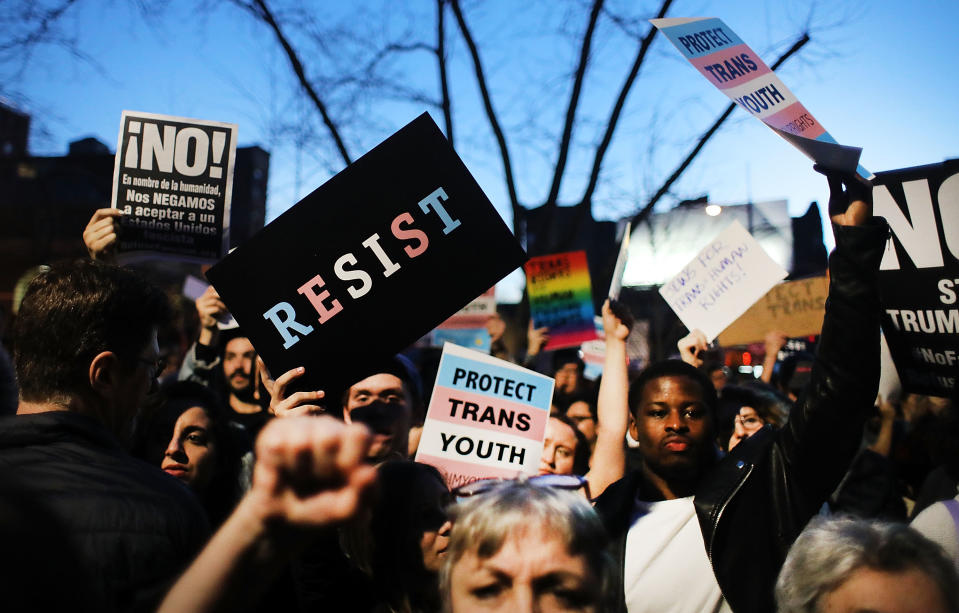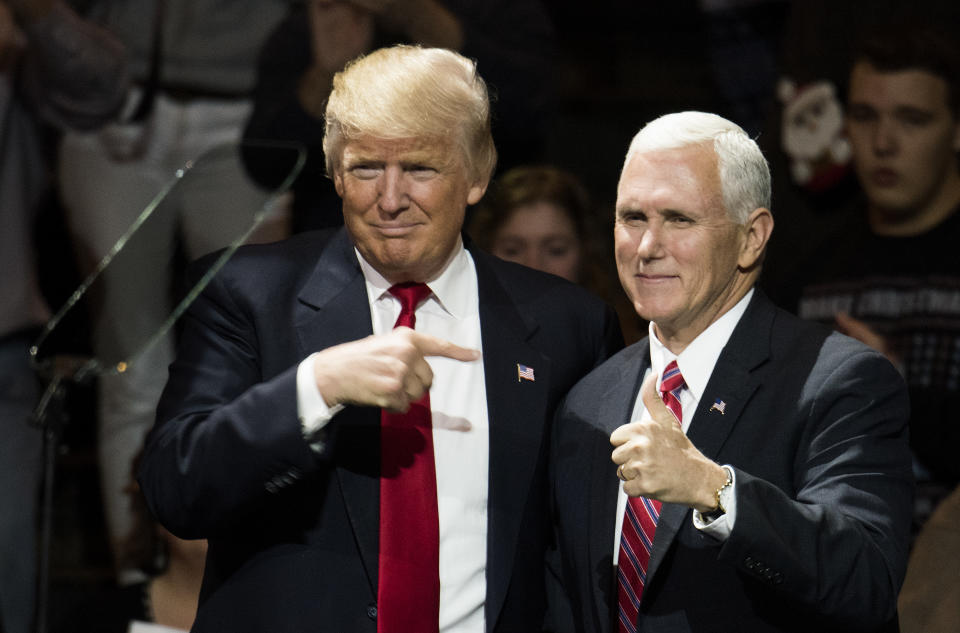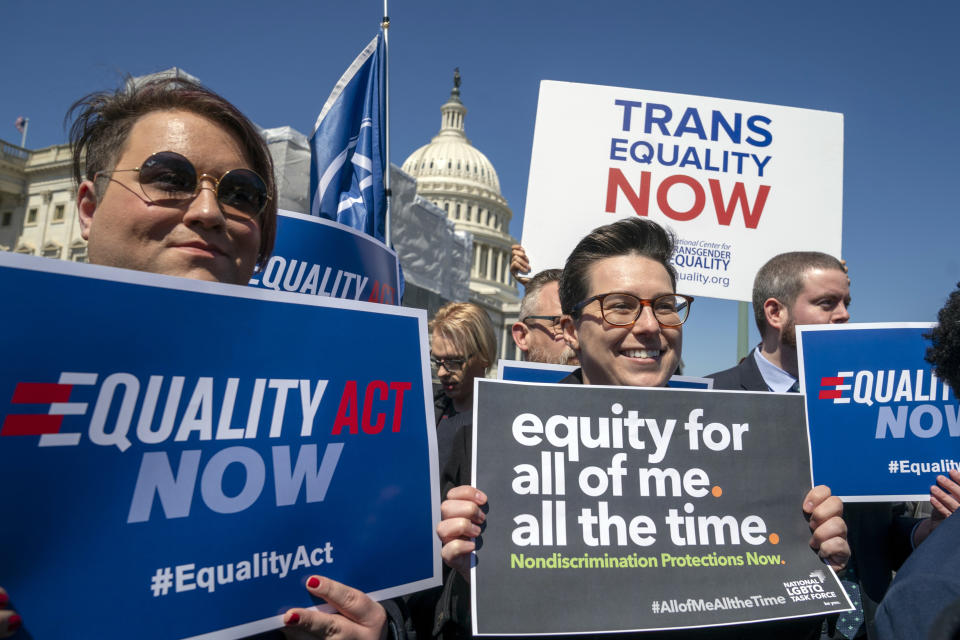For Pride Month, Trump has nothing to be proud of, activists say
During the 2016 campaign, Donald Trump presented himself as breaking from Republican orthodoxy and serving as a protector of LGBT citizens, earning a story in the New York Times with the headline “Donald Trump’s More Accepting Views on Gay Issues Set Him Apart in G.O.P.”
“As your president, I will do everything in my power to protect our LGBTQ citizens from the violence and oppression of a hateful foreign ideology,” Trump vowed in his Republican nomination acceptance speech. But since taking the oath, he has effectively rolled back rights for a community that saw great progress in the previous administration.
“From day one of Donald Trump and [Vice President] Mike Pence’s administration, they’ve targeted the rights and dignity of LGBT people,” Sarah McBride, national press secretary of the Human Rights Campaign, told Yahoo News. “This has become one of if not the most explicitly anti-LGBT administrations in modern American history.”
“The Obama administration was the single most inclusive presidency transgender people have experienced in our country’s history,” Gillian Branstetter, a spokesperson for the National Center for Transgender Equality, told Yahoo News. “They listened to the needs of our community and heeded the counsel of the medical community and researchers in fields ranging from health care to education to service in the military.”
When Trump officially recognized June as Pride Month in a tweet at the end of May, he called for the country to “stand in solidarity with the many LGBT people who live in dozens of countries worldwide that punish, imprison, or even execute individuals on the basis of their sexual orientation.”
He also invited other nations to join in his newly launched “global campaign to decriminalize homosexuality.”
“The words are very hollow,” Diana Flynn, litigation director of Lambda Legal, told Yahoo News. “Nobody in the LGBT community who’s felt the force of his efforts to marginalize them and promote discrimination against them is going to be fooled by those hollow words.”
“Every instance where Donald Trump has expressed support for the LGBT community has been just words,” said McBride. “His actions speak much louder than a single tweet.”
Below are some of the actions taken by the Trump administration that LGBT activists say undermine their cause.
Banned pride flags

The Obama White House was lit in rainbow colors after the 2015 Supreme Court ruling that legalized same-sex marriage, but the Trump administration has restricted American embassies from flying rainbow flags on their flagpoles in honor of LGBT Pride Month.
Under the Obama administration, rainbow flags could be flown at embassies if approved by ambassadors or chiefs of missions, as long as they were smaller than and positioned below American flags. The Trump administration changed the policy to require high-level approval from the State Department to fly pride flags at embassies. It has rejected all requests to do so, confirmed Pence, saying in an interview that only “one flag should fly.”
Reinstated transgender military ban
In July 2017, Trump announced via Twitter that he was banning transgender troops from serving in the military, citing medical costs and disruptions, although a 2016 study found that health care for transgender troops made up at most 0.13 percent of the overall military health care budget. The Supreme Court allowed this reversal of an Obama-era policy that affected thousands of enlisted Americans. The Department of Defense has said the policy is not a ban, since troops could serve as long as they presented as their birth sex, but new recruits who’ve undergone gender transition will be rejected, and transitioning is not allowed while in the service.
As of last year, 19 countries, including the U.K., most of the rest of Western Europe, Israel, Canada and Australia, allow transgender individuals to serve in their armed forces. Most American evangelical Christian leaders, including Trump’s outspoken supporter Jerry Falwell Jr., condemn gender reassignment as being against God’s plan.
Sided with Colorado baker
In a 2017 Supreme Court case, the Trump administration chose to side with Jack Phillips, a Colorado baker who refused to bake a wedding cake for a same-sex couple, in his suit against the Colorado Civil Rights Commission. Phillips said that providing a cake for a same-sex wedding would violate his religious freedom, and the Department of Justice agreed.
“Forcing Phillips to create expression for and participate in a ceremony that violates his sincerely held religious beliefs invades his First Amendment rights,” acting Solicitor General Jeffrey B. Wall wrote in the brief siding with Phillips.
In a narrow ruling, the court sided with Phillips over his treatment by the commission but didn’t rule on the larger topic of religious freedom and discrimination.
Reversed departmental protections

A number of Trump’s executive departments have changed policies in waysthat would make it easier to discriminate against transgender people. In early 2017, the Department of Education reversed Obama-era Title IX guidance protecting trans students in schools and colleges, making it more difficult for them to report harassment and use restrooms and other facilities of their choosing.
While Secretary of Education Betsy DeVos initially said the department was committed to investigating all claims of discrimination, she admitted in April that she knew of the potential harm to transgender students when she rolled back the protections. A 2018 Politico investigation found that DeVos had personally ended investigations into at least five civil rights complaints from trans students.
The Department of Justice also changed its policy. In October 2017, then-Attorney General Jeff Sessions reversed the Obama administration’s interpretation of Title VII of the Civil Rights Act of 1964, which had been held to protect transgender employees from workplace discrimination.
“During that effort, virtually every agency in the federal government, large and small, was consulted about the issue,” said Flynn, who before working at Lambda Legal spent 30 years in the U.S. Department of Justice’s civil rights division and left shortly after Trump took office, finding it “no longer tenable to morally serve given the positions the administration was taking.”
Efforts, including her own, that led to the anti-discrimination policy were “summarily reversed by Sessions with no consultation of the career staff that had been previously involved in that policy,” she said.
Additionally, the Department of Housing and Urban Development proposed a new rule in May that critics say would make it difficult for transgender individuals who are homeless to get shelter. The Department of Health and Human Services issued a memo last year that seemed intended to define the term “transgender” out of existence, interpreting Title IX to only address sex at birth.
Ended diplomatic visas for same-sex domestic partners
As of last year, same-sex partners of foreign diplomats posted to the United States can no longer receive family visas unless they are married — which would exclude partners from countries that do not recognize same-sex marriages. The decision also applied to people working in the United States for the World Bank, NATO and other international organizations.
Nominated controversial figures

A number of Trump’s nominees to the executive and judicial branches have been criticized for anti-LGBT positions.
Sessions, who supported a constitutional amendment to ban same-sex marriage and questioned whether prosecuting hate crimes based on sexual orientation was “in the federal interest.”
DeVos, whose family donated millions to groups supporting anti-LGBT policies.
Housing and Urban Development Secretary Ben Carson, who said in 2015 that being gay was a choice. Carson later apologized for the comment.
Secretary of Army nominee Mark Green, who compared transgender people to ISIS members and said they had a “disease.” Green eventually withdrew his nomination, stating that his “life of public service and my Christian beliefs have been mischaracterized and attacked.”
Both of Trump’s Supreme Court appointments, Neil Gorsuch and Brett Kavanaugh, were criticized by LGBT groups.
Federal circuit court nominee Jeff Mateer, who discussed discriminating on the basis of sexual orientation and described transgender children as part of “Satan’s plan.” Mateer’s nomination died in the Senate.
However, the Trump personnel choice that most concerned LGBT groups was one of his first: Choosing Indiana Gov. Mike Pence as his running mate. Pence has a long history of backing anti-LGBT policies, including supporting gay conversion therapy (a charge Pence denies), supporting amendments to ban same-sex marriage in both the U.S. and Indiana constitutions and signing a controversial “religious freedom” bill that allowed discrimination based on sexual orientation.
Cleansed various websites
Shortly after Trump was sworn into office on Jan. 20, 2017, the White House removed an entire page of LGBT issues from its official website, while the Labor Department’s website removed a report on LGBT workers’ rights. Days later, the State Department removed from its website an apology from outgoing Secretary of State John Kerry for the “lavender scare,” a 1950s witch hunt during which the federal government purged homosexual employees.
The Washington Post reported in December 2017 that Trump’s Health and Human Services Department advised staffers to avoid certain words in official documents, including “transgender” and “diversity.” Advocacy groups have called for the return of a question regarding sexual orientation to a survey of older Americans after the administration removed it.
Opposed the Equality Act

Before the House passed the bipartisan Equality Act, which would protect LGBT citizens from discrimination in housing, employment, public accommodations, jury service, education and federal programs, the Trump administration came out against the sweeping LGBT rights bill.
“The Trump administration absolutely opposes discrimination of any kind and supports the equal treatment of all,” an official stated. “However, this bill in its current form is filled with poison pills that threaten to undermine parental and conscience rights.”
The bill, which was introduced in Congress in 2015 and was supported by President Obama, would amend the Civil Rights Act of 1964 and the Fair Housing Act to ban anti-LGBT discrimination. Since passing the House in May, the Equality Act has been sent to the Senate, which has not acted on it.
“In the next two years,” said the Human Rights Campaign’s McBride, “we will have to continue to resist any attack by this administration to discriminate against LGBT people.”
_____
Read more from Yahoo News:


